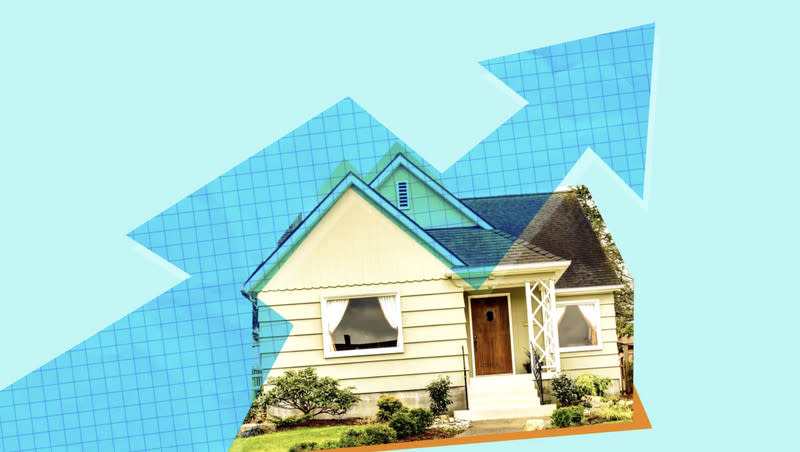5 tips every first-time homebuyer should consider

There is no shortage of obstacles for first-time homebuyers in this economy, including high interest rates, but that doesn’t mean that buying a house is an impossible dream.
Even amid the gloomy housing forecast, Salt Lake City realtor Joel Carson said he’s optimistic about the housing market and even called it “a good time to buy.”
“These higher rates have slowed the market in real estate to the point that sellers are finally starting to reduce prices and pay concessions,” he told the Deseret News. “Right now you can get the seller to pay a lot of closing costs.”
Here are some tips Carson and other experts have shared that can make buying a home more attainable even with the high interest rates.
Related
1. Get prequalified
The first thing a potential buyer should do is get prequalified and figure out what their budget is, Carson said. Taking that step expedites the homebuying process and prepares the buyer by, for example, helping them understand their interest rate options and maximum mortgage amount.
Prequalifying is a process through which a lender will look into a potential buyer’s credit history and see if they could qualify for a mortgage, how much they qualify for and at what interest rate, per Bankrate.
2. Get a realtor and let them negotiate with sellers
A real estate agent or realtor can help a buyer explore available houses and negotiate prices. They can also help the buyer secure concessions, such as the seller agreeing to cover the realtor’s commission or help buy down the buyer’s interest rate, Carson said.
“Right now we’re seeing sellers contribute anywhere from 3 to 6% to help the buyer buy their interest rate down,” he said. “In a seller’s market, that’s not even possible.”
3. Get in as soon as possible
Carson recommends buying a home as soon as possible, so that you can start building equity.
“Most first-time homebuyers can’t save fast enough to keep up with the market, and if you’re being told to save 20% (to avoid private mortgage insurance fees) ... that’s $100,000 on a $500,000 property. Most buyers could never do that,” said Carson.
“It’s better to put a minimum down, get into the property, build some equity, and use that home as a ‘stepping stone home,’” he said.
If rates drop later on, the house can be refinanced to the lower rate, Carson said.
But if interest rates continue to go up, like the increase from around 3% to around 7% in Utah over the past two years, refinancing wouldn’t make sense.
Though interest rates haven’t increased for several months, it doesn’t mean they won’t, reported Forbes.
“I expect the (Federal Reserve) to keep the option for an additional future rate hike on the table, even if the odds it will need to exercise that option are low,” Danielle Hale, chief economist at Realtor.com, told Forbes in an email.
4. Take advantage of first-time homebuyer programs
A down payment for a first-time homebuyer may be as low as 3.5%, said Carson. And there are programs out there that will cover even that and get the buyer into a home without any money down.
Loans from the Federal Housing Administration (FHA) or The United States Department of Agriculture (USDA) can make it possible to buy a home with little to no down payment, according to Utah lending agency Intercap Lending.
But most of these kinds of programs have strict requirements that first-time homebuyers have to meet. For example, the USDA loan typically requires a 640 credit score (exceptions apply), the home must be used as a primary residence, and it should be located in a rural area, per USDA.
About six months since the launch of Utah’s new First-time Homebuyer Assistance Program, 460 families have used the program for help with their down payment and/or help buying down their interest rate, as the Deseret News previously reported.
Carson said that, since the types of grants and loans available to first-time homebuyers are constantly changing, the best person to talk to is a lender who is up to date on all the local, state and federal money available for individual situations.
Related
5. Co-sign
Co-signing is a great option for those buyers who can afford the mortgage payment but either don’t have a credit history or have a rough credit history, per Business Insider.
“Co-signers are typically family or parents. We see a lot of that,” said Carson.
But the arrangement can be unattractive for the co-signer because they won’t have any claim on the house but will still be penalized if the mortgage payments are late, reported Business Insider.
A word of caution on house hacking
A lot of buyers think that renting out a part of their newly purchased house, a plan known as “house hacking,” will be their ticket to affording a house, but that’s not always the case.
House hacking is becoming an increasingly popular idea among Gen Z and millennials, according to the housing market site Zillow.
While house hacking can help homeowners more easily afford the mortgage payment, it doesn’t necessarily help first-time homebuyers get into a house.
In order to get a mortgage approved, the buyer has to prove they could cover the whole mortgage without renters, reported CNBC.
“If you’re going to rely on rental income in order to qualify, you’ll have a problem,” Melissa Cohn, mortgage banker and regional vice president of William Raveis Mortgage, told CNBC.

